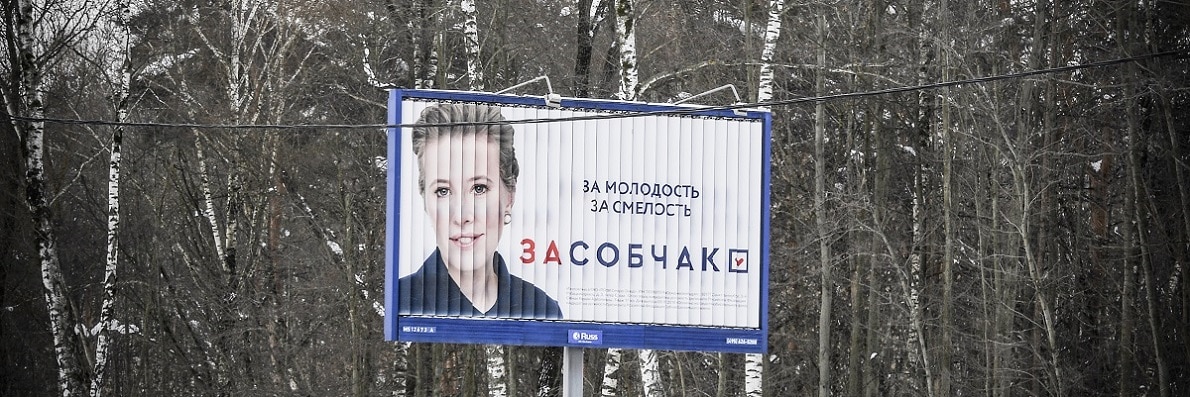As the elections near, there is no question that Vladimir Putin is certain to begin his fourth mandate as president of the Russian Federation. If his re-election appears preordained, the same cannot be said for electoral turnout, the main indicator of a leader’s popular support.
Opposition forces in Russia have different views on this issue. One the one hand, there is Aleksey Navalny, the politician and activist always at the front lines against corruption. Navalny was recently excluded from the electoral competition due to a financial scandal orchestrated by the Kremlin,and has explicitly asked Russian voters to not show up at the polls in order to protest a deeply corrupted system that denies pluralism and democratic values.
On the other hand, there is Ksenia Sobchak, the journalist and TV host who promotes the belief in an “evolution” rather than a “revolution” in Russian politics. She believes that Russians should change their passive mentality and take action by voting for her to finally restore their faith in politics and domestic institutions. Upon closer look though, Sobchak’s positions are quite ambiguous and cast doubts on the authenticity of her initiative. Her family history is quite telling: she is the daughter of Analtoly Sobchak, the first democratically elected major of Saint Petersburg (a mentor of both Putin and former president Dmitry Medvedev) and of Lyudmila Narusova, deputy of the “Fair Russia” party, widely considered a fake opposition party.
The airtime Sobchak has received so far is significantly higher than the other candidates. Even more so, she won some points in a recent confrontation with LDPR leader Vladimir Zhirinovsky when she reacted to his sexist accusation by throwing water at him. This incident revealed just how ridiculous the current landscape of political opposition is in the country. Last month, Sobchak traveled to the United States and her talk at the Center for Strategic and International Studies in Washington, D.C., revealed some ambiguities. Although in her speech she discussed topics very dear to the Western world like democracy, rule of law and privatizations, she also mentioned that Russia has been “marginalized by Europe” and excluded from the EU integration process because Europeans “never overcame their instinctive fear of Russia.”
If it is true that the history of West-Russia relations is loaded with misunderstandings, it is also true that such a well-structured narrative perfectly fits the social, political and identity structure that Putin represents. In this regard, Sobchak offered a political perspective based on a gradual political transition that rejects “regime change”. Not surprisingly, regime change is Putin’s greatest fear, as he believes that it can happen in Russia just as it has happened in some post-Soviet countries with the help of the West. When asked about the concrete measures foreseen in her program, Sobchak offered no real answers and talked about the need for a cultural change in Russian mentality that usually associates liberalizations policies with the economic chaos that occurred in the ’90s. Although she blames Putin for Russia’s catastrophic economic situation, she also thinks that the president would rather be resting in Sochi instead of ruling the country but has no other choice because the system he created is too centered on his persona. For this reason, according to Sobchak, it is important to ensure a smooth transition and ensure Putin’s future impunity in order to allow him to give up power more easily.
As far as international relations are concerned, Sobchak admitted Russia’s responsibility for Crimea and Donbass. She insisted on the importance of an immediate halt to support of the rebels in Eastern Ukraine. The Russian journalist also proposed a referendum under the supervision of international authorities to define the future of the Crimean Peninsula. Not surprisingly, Sobchak did not devote many words to Russian interference in the U.S. presidential campaign, a major Western concern, and in fact declared that she knew nothing about the subject.
What is interesting about Sobchak is a convergence of the Kremlin’s goals with the manner she brings them up in, a more diplomatic way that is more likely to open windows of dialogue with the West. It is no coincidence that Sobchak stated that her trip to the United States was motivated by the necessity of softening tensions between Washington and Moscow. The scope of her program and goals can easily be questioned – Sobchak herself admitted that she has no chance of winning – but her campaign aims to prepare the ground for the 2024 elections. However, there is no doubt that instead of representing a sign of change and protest like the massive boycott called by Navalny would, the simple fact that the Russians would go to the polls – even to vote for Sobchak – would only legitimate the existing regime. How much longer should Russians wait for this “evolution”?


